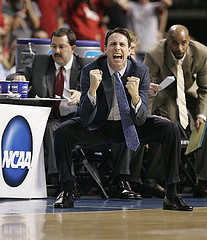Archive for April 19th, 2009
How can parents hold coaches accountable…
…without being an asshole about it?
I wrote the last portion of that question, but that’s a statement often implied when someone is, say, turning to the Positive Coaching Alliance to get an answer to the thorny questions of youth sports. In this case, an anonymous parent wondering, basically, why everyone else has to sign a code of conduct promising to be a goody-goody while the coaches get to carry on like Bob Knight with a case of flaming hemorrhoids.
 Possible case of ‘roid rage.
Possible case of ‘roid rage.
The exact question posed to the readers of the blog of the Positive Coaching Alliance:
My daughter goes to a very competitive public high school with a winning tradition. However, some of the coaches with the best winning traditions are also some of the worst coaches when it comes to how they treat the kids. These coaches are allowed to scream and yell at our children with no consequences.
Our kids are put down amongst their peers and even cursed at in public. Yet the teams win and nothing is done. A few years ago our school implemented a Code of Conduct for all athletes and parents to sign. The Code is not strictly enforced, even though athletes and parents must sign a new one for each new season or sport.
What kind of Code of Conduct should the coaches be held accountable to? When the Code is broken by a coach, how should it be dealt with? Our coaches are also teachers in the school and they are part of the union, which makes it difficult for parents to question a coach’s tactics and behavior because of the fear of retribution not only to the athlete (playing time, etc.) but also to the student and their grades. I cannot sit on the sidelines any more and something must be done. I need your help!
Here is my answer, which I have submitted to the PCA blog:
You know what you can do about this? Most likely, shut up and take it.
That’s not the answer you wanted, and that’s not the answer I want to give. But if you’re at a competitively public high school with a winning tradition (like my old high school, where I for a while ran track and cross country for a coach with multiple state championships), these coaches are beloved by many for their results, and that support includes many alumni and fellow parents, as well as the current school administration. If you want an indication of the loyalty a seemingly over-the-top coach can engender, go to Support Our Stinson to see the massive amount of love pouring out for a coach facing a reckless homicide charge after one his players died as a result of one of his practices. The teachers’ union is the least of your problems.
If you (and your child) find the coaches too much, you have one relatively easy option — taking your child off the team. I say “relatively” because I presume you fear some sort of backlash from coaches, or some negative change in your child’s social circle. At the least, your child can finish the season, then quit the sport and concentrate on intramural, rec league or club-level competition.
Otherwise, if you are planning to fight what is going on with the coach, the first thing I would recommend is taking your emotions out of this. Yes, it’s your child, your baby. But you have to ask yourself — is there a reason the coach is acting the way he or she acts? Talk to other parents whose child has played for that coach, for example. Don’t ask, “How could your child stand such a tyrant?” Ask, “What did you think of that coach? What did you think of the way that coach handled players?” If you don’t want to be seen as the crazy, overprotective parent, don’t act like one. If you sense a lot of anger and upset among the parents, then you can come to the administration as a group. The administration might not do anything, but it can’t ignore a large group of parents making the same complaint.
Also, there’s nothing wrong with asking to talk to the coach. Again, it’s about approach. If you introduce the conversation as one where you want to ask the coach why he’s such a jerk, prepare to be brushed off or patronized. Instead, introduce yourself and ask if there would be an opportunity to chat one-on-one as a new parent wishing to get to know him (or her) or the program better. The coach is probably still going to be nervous that you’re some crazy, overprotective parent. But a good coach will make a little time and explain why he or she does what he does. You might not agree with it, but at least you might understand it better.
One other thing you can do: talk to your child. Does the coach’s conduct bother your child? How do teammates respond to it? What is the team morale? If your child feels like the coach is coming from a positive place, then maybe the best thing for you to do is back off.
Meet the face of the second wave of feminism

This is my 9-year-old daughter, Grace, who unbeknownst to her is among the leaders of a second wave of feminism because she’s good at sports and school and isn’t going to hold herself back to look good for some boy.
From this morning’s Chicago Sun-Times, which put Kara Spak’s story on its cover:
… [M]iddle school-age girls across the country are increasingly chasing their goals with gusto, both on the field and in the classroom, said Barbara Risman, head of the University of Illinois at Chicago’s sociology department and executive officer of the Council on Contemporary Families. Risman co-authored a study on contemporary middle school children being presented this weekend in Chicago at the council’s yearly convention.
With fellow researcher Elizabeth Seale, Risman spent months interviewing and observing middle school students at a racially integrated, largely middle-income school district in the southeastern United States.
“What I found was that girls seem remarkably free to do many kinds of behaviors that a generation ago would have been closed to them,” Risman said. “They were very comfortable with being competitive at sports. Being athletes is part of an ideal-girl kind of package these days.”
Today’s middle school girls are also “perfectly willing” to compete with boys in the classroom, she said.
“I did not get any indication that girls felt they had to be less smart than the boys to be attractive to boys,” she said.
Risman calls this phenomenon the “second wave of feminism.” The notion that girls need to be less than boys in order to appear feminine is “a relic of the past,” she said.
As the father of two daughters I find it heartening that they will grow up in a world where girls don’t feel the need to hold themselves back. I find it disheartening, however, that girls acting in this way is front-page news.
But the researchers say, as always, there is a flip side to the progress they see:
There is a downside, though, Risman found in her research. Some of the 10- to 12-year-old girls she studied are dieting and “almost obsessive” about their appearance as a way to channel femininity, she said.
And while girls are free to pursue activities that once might have been considered the purview of boys, the same options aren’t available to boys, she said. Cheerleading, for example.
“Everyone thought a boy who would do something like that would be mercilessly teased,” Risman said. “The gender revolution has had an impact in making the girls’ movement broader and wider. It hasn’t for boys.”
That last point is interesting, because as it turns out, the focus of Risman’s paper had nothing to do with young girls. It was called “Have Boys Been Left Out of the Gender Revolution?” From the press release of the event where it was released:
Boys have gained fewer freedoms to explore their individual interests and talents from the gender revolution. Boys are still reluctant to admit to enjoying any activity, from gymnastics to dancing to knitting — or even reading books — that smacks of something girls do. And they now seem to be subjected to the same kind of teasing about supposedly “gender inappropriate” activities or interests than girls used to face 45 years ago. Today it is young boys who are afraid of showing off how smart they are and who feel they have to pretend to be interested in certain activities and not others for fear of being taunted as “gay.”
While I’m proud of my two daughters for being strong-willed and confident, I’m also the father of two sons — one of whom tells me stories about how the boys at his old school would pounce on anyone who exhibited the slightest interest or activity in something that was perceived not to be within the norm of boys, namely being a tough guy whose obsessions extended from sports to sports. (This son, by the way, plays sports, but doesn’t care to watch them.)
It’s heartening that my son sees the problem with rigid enforcement of gender roles. It’s disheartening that it takes place — and maybe that should be front-page news as well. None of my kids should need to grow up worrying about what boys will think about his or her interests.